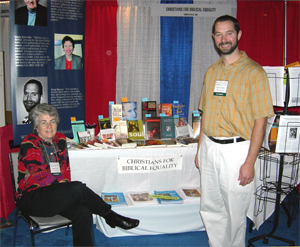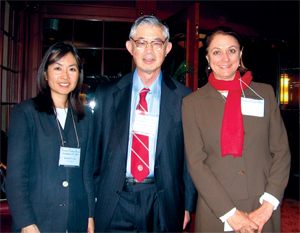|
Egalitarians make valuable
contributions to the 2006 Evangelical Theological Society Annual
Meeting
Chelsea DeArmond
Christians for Biblical Equality hosted a booth and a community dinner at the 2006 Evangelical Theological Society annual meeting in Washington, D.C., Nov. 15–17.
Before the convention, CBE members and friends met at Margot Eyring’s home for a dinner with Richard Gathro, vice president of the Council for Christian Colleges & Universities (CCCU), and his wife Kathrine. The dinner was followed by a discussion of the Trinity led by Kevin Giles, author of
The Trinity and Subordinationism and Jesus and the Father. In addition to hosting CBE President Mimi Haddad and Kevin and Lynley Giles, Margot also volunteered at CBE’s booth during the conference.
A full-page advertisement in the ETS program announcing the twentieth anniversary issue of
CBE's academic journal Priscilla Papers and free articles on biblical equality written by leading ETS scholars drew many visitors to CBE’s booth. Hundreds of resources on gender and the Bible were distributed to professors and students at evangelical seminaries in the United States and beyond. Workers at the booth had opportunities to engage critics, fellowship with colleagues, and encourage women who had been prevented from using their gifts in churches and schools because of their gender.
CBE members presented papers on topics ranging from core Christian practices such as feeding the hungry to core Christian doctrines such as the Trinity. Their commitment to Scripture and the quality of their scholarship highlighted the ongoing value of egalitarians’ contributions to the ETS and evangelical theology and practice more broadly.

CBE booth
volunteers Margot Eyring (left) and Tyler DeArmond (right)
ETS
president commends CBE founders
CBE members such as Linda Belleville,
Aída Besançon Spencer, and Catherine Clark Kroeger presented
papers and moderated sessions on a variety of topics. All three
of these women were commended in ETS President Edwin Yamauchi’s
presidential address, in which Cathy Kroeger was applauded by
the entire assembly for resisting liberal movements and founding
Christians for Biblical Equality. Dr. Yamauchi also noted
historical examples of evangelicals such as prominent
abolitionist Theodore Dwight Weld and his wife Angelina Emily
Grimké who believed the Bible supported the freedom and equality
of both slaves and women.
In light of these current and
historical examples, Dr. Yamauchi addressed several recent
complementarian publications that suggested egalitarianism leads
to liberalism and is inconsistent with biblical inerrancy. He
cautioned that, “If egalitarianism is pushed too far, it does
cause a real problem of liberalism. Complementarianism, however,
pushed too far can enmesh us in a swamp of legalism.”
Rather than seeking to restrict women’s
contributions to evangelical scholarship, Dr. Yamauchi quoted
ETS founding member Frank Gaebelein (father of CBE founding
member and Priscilla Papers editor emerita Gretchen Gaebelein
Hull) that “Another piece of unfinished business relates to the
place of women in our society…there are areas…in which women
need greater freedom and more support and recognition.”
Dr. Yamauchi also called for greater
ethnic diversity. In a version of his address prepared for
publication in the March 2007 issue of the Journal of the
Evangelical Theological Society, Dr. Yamauchi cited 2001 ETS
President Darrell Bock’s challenge that, “the primary value of
the ETS is the mixture that is here (and we need to do better
with regard to that mixture, ethnically, in terms of gender, and
internationally).”
Dr. Yamauchi modeled evangelical
scholarship that remains committed to biblical inerrancy without
becoming enmeshed in legalism by critically engaging both
egalitarian and complementarian scholarship. He commended Harold
Hoehner’s (Dallas Theological Seminary) innovative thesis that
pastor/teacher is a spiritual gift that both women and men may
receive. In his work with the newly-formed study group on
Asian-American Christian Thought, Dr. Yamauchi also modeled
commitment to greater ethnic diversity within ETS.

Biola University professor
Michelle Lee (left), 2006 ETS President Edwin Yamauchi (center),
CBE President Mimi Haddad (right)
Egalitarian contributions to the Gender and Evangelicals Study
Group
CBE members also presented papers in
sessions hosted by the Gender and Evangelicals Study Group (GESG).
This study group provides a scholarly forum for egalitarian and
complementarian scholars to explore gender in the church, home,
and world from theological, biblical, historical, and pastoral
perspectives. The GESG is co-moderated by an egalitarian, CBE
president Mimi Haddad, and a complementarian, Phoenix Seminary
vice president of academic affairs Steve Tracy.
Dr. Haddad commented that
“Presentations at this year’s Gender and Evangelicals Study
Group were thoughtful, well-researched and generally they were
also conciliatory and irenic in tone. With four panels, and a
total of thirteen speakers, humility, challenge, and passion for
the Gospel characterized most presenters.” She noted
complementarian John DelHousaye’s (Phoenix Seminary) paper on
Jesus’ inclusion of women in his circle of disciples as an
example of scholarship that “created new common ground for both
egalitarians and complementarians in perceiving the radical
treatment of women by Christ as he moved beyond ritual taboos to
include women as full members of the new Covenant.” A popular
version of Dr. DelHousaye’s paper was published in the Spring
2006 issue of CBE’s quarterly magazine Mutuality. Another
recent Mutuality author whose work appeared on the Spring
2006 issue, egalitarian Carrie Miles (George Mason University),
also presented an excellent paper on the topic of Christianity
and family values.
This year GESG sessions focused on the
topics of gender and justice and the doctrine of the Trinity. In
October of 2005, CBE revised its mission statement to include
its commitment to the biblical call to justice. The GESG
provides a venue for further articulating this conviction in
dialogue with leading egalitarian and complementarian scholars.
For example, complementarian Russell Moore (Southern Baptist
Theological Seminary) and egalitarians Ron Sider (Palmer
Theological Seminary), Cynthia Long Westfall (McMaster Divinity
College), and Linda Belleville (Bethel College, Ind.) read
papers in the session on “An Evangelical Perspective on Justice
and Gender.”
In addition to the inerrancy of
Scripture in its original autographs, the following belief is
identified as a core doctrine of the ETS: “God is a Trinity,
Father, Son, and Holy Spirit, each an uncreated person, one in
essence, equal in power and glory.” Several prominent
complementarian scholars have proposed a view of the Trinity
that affirms the essential equality of all three persons, but
also affirms an eternal relationship of supremacy and
subordination between the Father and the Son. They argue that
the Son’s eternal subordination to the Father within the Trinity
provides the theological basis for the permanent subordination
of women in relation to men.
The GESG session on “The Trinity and
Gender” discussed this complementarian teaching in light of
Scripture and the historic Trinitarian doctrine of God. The
subordinationist view of the Trinity was presented by
complementarian Bruce Ware (Southern Baptist Seminary), and
challenged by egalitarians Millard Erickson (Truett Theological
Seminary) and Kevin Giles (vicar of St. Michael’s Church).
Erickson noted biblical, philosophical, practical, and
theological problems with the view, and Giles offered a
primarily historical critique in light of the teachings of
Athanasius, the Cappadocians, Augustine, and Calvin, as well as
numerous creeds and confessions.
Mimi Haddad attributed the GESG’s
success to the importance of the topics and the tone of the
presentations, “I believe the lectures were more irenic and
better attended because they explored issues that were not only
core to orthodox theology, i.e. the doctrine of God, but also
practical matters were likewise considered, i.e. evangelical
responses to lesbianism and abuse.”
The GESG sessions at the 2007 ETS
annual meeting in San Diego, Ca., will be co-moderated by
egalitarian Cynthia Long Westfall (McMaster Divinity College)
and complementarian Gerry Breshears (Western Seminary). Paper
inquiries and proposals for consideration in GESG sessions can
be sent to cbe@cbeinternational.org.
ETS egalitarians
face ongoing challenges
Egalitarian evangelicals have been
encouraged by the leadership of current ETS President Edwin
Yamauchi and many of his predecessors. Ron Sider and others’
call for gender justice and Millard Erickson and Kevin Giles’
strong defense of the historic doctrine of the Trinity against
the subordinationist view in sessions hosted by the GESG also
made significant contributions to egalitarian scholarship.
However, many challenges remain for ETS
egalitarians. Based on his experience as 2005 program chair, Dr.
Yamauchi noted that less than 10% of non-study-group papers are
presented by women, and these figures are even lower for people
of color. No women serve on ETS committees listed in the
society’s journal. Dr. Yamauchi concluded that the ETS has “a
long way to go before we are representative of society as a
whole and of Christianity as a whole.”
Research that articulates the biblical
basis for the egalitarian view of gender and defends the
historic doctrine of the Trinity is also under-represented in
recent volumes of the Journal of the Evangelical Theological
Society (JETS). In an appeal to the ETS Editorial and
Executive Committees, New Testament scholar Philip Payne noted
that since the current editor of JETS took office in 1999, the
journal has not published “a single exegetical defense of the
equal standing in Christ’s church of woman and man or a single
defense of non-hierarchical interpretation of the eternal
relationships of the persons of the Trinity.” Egalitarian
scholars who have written responses to complementarian
colleagues have also been denied publication in the journal.
At the next ETS annual meeting,
prominent complementarian and Trinitarian subordinationist Bruce
Ware will begin a three-year term as Vice President (2007),
President-Elect (2008), and President (2009).
Though the 2006 annual meeting was
encouraging, the need for evangelical scholarship that affirms
biblical equality and justice remains great. |